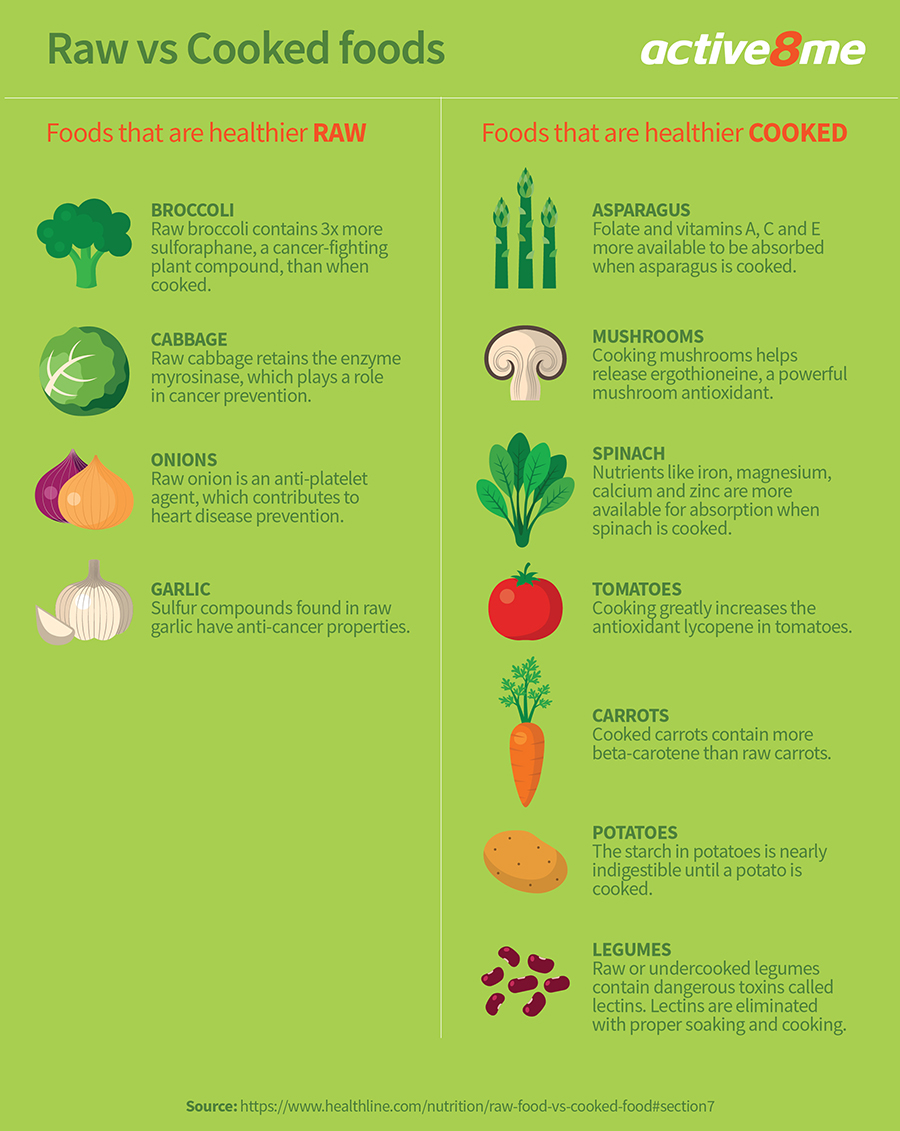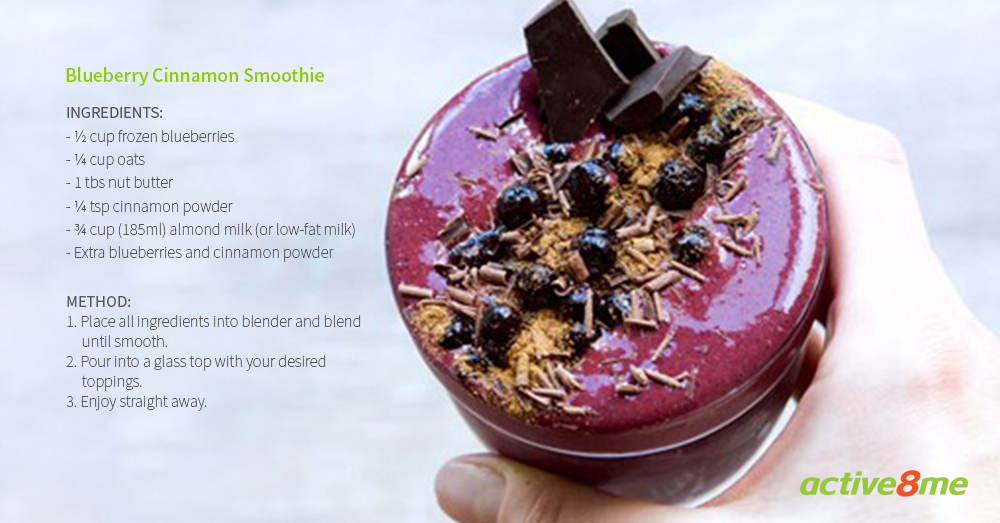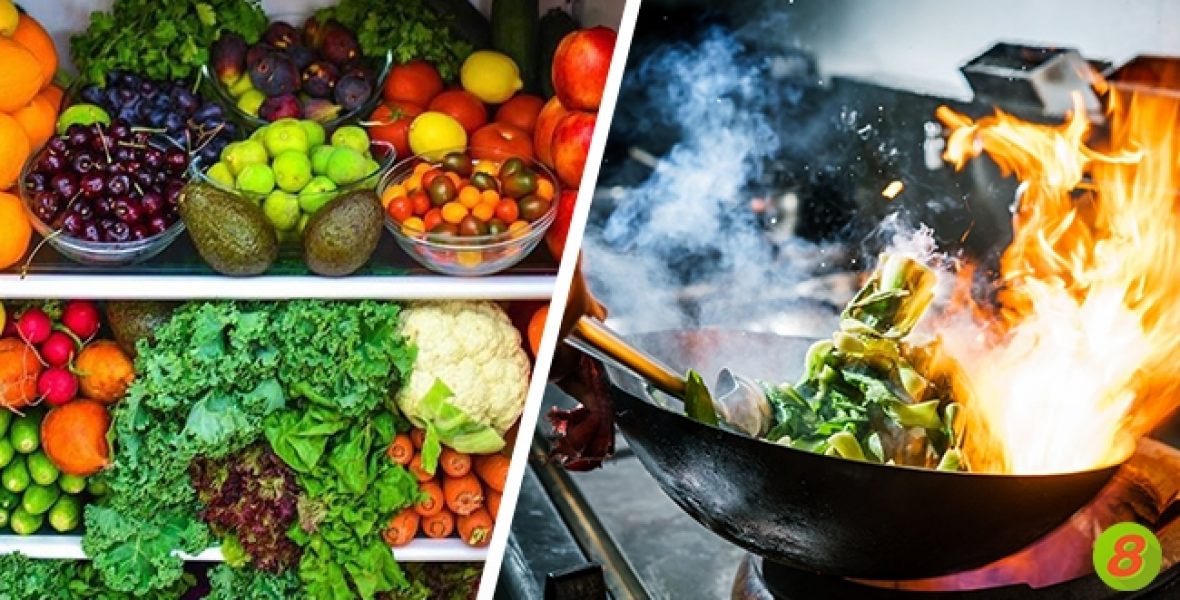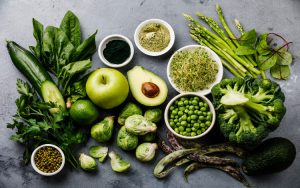We love a good salad, and we believe in eating ‘clean’, that is, more wholefoods, less processed foods. But we wonder what it would be like to only ever eat a raw food diet? Hmmm, no warming soups or fresh bread. No lean, grilled meat to accompany that salad. No rice or pasta…
The ‘weight loss industry’ has come up with a repackaged gimmick for every type of diet there could possibly be. But, we must admit we were quite intrigued with the emergence of the raw food diet and its health benefit claims. Today we are weighing up the pros and cons of the raw food diet and addressing whether it is better for you than a conventional, balanced diet.
What is the raw food diet?
The raw food diet is not a new phenomenon. Like all trends, what’s old is new again. It originated in the 1800s where a group of physicians dedicated their practices to utilising nutrition as a form of health regulation. As its name suggests it is based on completely raw and unprocessed foods.
A raw food diet generally consists of fresh fruits, vegetables, nuts, seeds, sprouted grains and legumes, none of which have been heated or cooked at temperatures greater than 40 to 48 degrees Celcius. While most raw-foodists are solely plant-based consumers, it is worth pointing out that there are some who still also consume eggs, dairy and meats (uncooked).
The premise of the raw food diet is that raw food best retains nutrients and enzymes important to healthy human function, when compared to the same foods that have been cooked. So, if this is true, why isn’t every doctor or health practitioner recommending it?
Raw food diet pros
1.You eat more fruit and vegetables and less junk than the average person
The modern diet contains a high proportion of processed foods, especially in the form of junk food snacks. Generally, this high amount of incidental sugar is the cause of many health problems. Read more about the dangers of this in The Sweet Truth About Sugar . So, it is no surprise that the increased intake of fruit and vegetables with the raw food diet is a much healthier scenario than most ‘normal’ eating patterns. In particular, increasing fruit and vegetable consumption can aid in lowering blood pressure. However, there is no evidence to suggest that the raw food diet is any more beneficial than a vegan diet where cooked foods are also consumed.
2. You will lose weight
By cutting out processed food and cooked foods, such as meats and grains, you will see a dramatic drop in calories. As a result you will benefit from weight loss (if that is your aim). But this is not from any inherent factors of the food being raw, but rather the reduced calorie consumption.
3. Some foods are healthier raw
There are definitely some foods that are better for your health when eaten raw. For example, foods that contain water soluble vitamins, such as vitamin C and the B vitamins can lose up to 60% of their vitamin content when boiled. Take a look at the infographic below.
4. You access ‘beneficial’ enzymes
This is a contentious ‘positive’, as raw food advocates claim that the enzymes in plant foods have health promoting and disease preventing qualities. While it is true that cooking plant-based foods deactivates their enzymes, the idea that these enzymes are of significant health benefit is not scientifically proven.

Raw food diet cons
1.Hard to sustain
This would have to be one of our biggest gripes with the raw food diet. Like many diets that we’ve spoken about, for example, the ketogenic diet, the intense restriction makes it a very difficult diet to live your life in a healthy and enjoyable way. The raw food diet can easily set you up for the trap of yo-yo dieting, which despite the improved intake of good quality foods, can have negative and detrimental impacts for your life and life long health.
2. Uncooked dangers
Some foods contain dangerous bacteria and microorganisms that are only eliminated by cooking. Eating a completely raw diet that includes fish and meat comes with a risk of developing a food-borne illness.
3. Cooked foods are easier to chew and digest than raw foods
Cooking food makes the digestive process more effective and allows better absorption of food’s nutrients.
4. Cooking improves bioavailability
It is a myth to categorically say that cooking destroys nutrients. It is true that some nutrients are lost in cooking. But equally cooking your vegetables may make certain antioxidants more available to your body than they are in raw foods. For example, cooking tomatoes increases the bioavailability of the antioxidant lycopene (an anti-cancer compound) by five-fold. See infographic above.
5. Nutrient deficiencies
There is no denying that an abundance of fruits and vegetables (whether raw or cooked) are excellent food sources for many vitamins and minerals. However, by cutting out food groups like meats, dairy and legumes there is an increased risk of depriving yourself of important nutrients such as calcium, zinc and iron. This can lead to deficiencies and can result in long term health consequences, such as low bone density.

Mythbuster
We absolutely advocate clean eating and most definitely see the benefits of incorporating fresh raw foods into your diet on a regular basis. In fact, many of the Active8me recipes incorporate fresh, raw foods. So please don’t misunderstand us. Fresh, unprocessed food is good! So there is no doubt you will reap the benefits from fuelling your body with raw foods – some of the time. And that’s the key phrase. A fully raw food diet, like any ‘restrictive diet’ has some flaws, with many studies suggesting it can be detrimental to your health.
More generally though, forgoing cooked food eliminates, or significantly reduces, essential food groups and makes it difficult for many people to obtain adequate amounts of each macronutrient. Optimal health requires a balance of carbohydrates, proteins and fats. Most importantly, whether it be the raw food diet, the keto, the paleo, or some other diet, it needs to be sustainable over the long term for today’s present living conditions.
What’s best for you?
The best ‘diet’ is a balance of clean eating, controlled portions, plenty of water and understanding what fuels your own body best. If you want this type of balanced approach, along with dietician’s and other experts who have put together nutrition plans, workout plans and mindset lessons, then try one of the Active8me programs today! They are designed by experts for your success.












